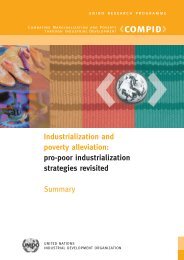Manual on the Development of Cleaner Production Policies ... - Unido
Manual on the Development of Cleaner Production Policies ... - Unido
Manual on the Development of Cleaner Production Policies ... - Unido
You also want an ePaper? Increase the reach of your titles
YUMPU automatically turns print PDFs into web optimized ePapers that Google loves.
DEVELOPMENT OF CP POLICY<br />
MODULE 5: POLICY TOOLS AND INSTRUMENTS<br />
5. Envir<strong>on</strong>mental management accounting<br />
C<strong>on</strong>venti<strong>on</strong>al costing systems used in enterprises have several limitati<strong>on</strong>s, inter alia <strong>the</strong>y do not<br />
take into account envir<strong>on</strong>mental costs and liabilities. Envir<strong>on</strong>mental management accounting is a<br />
tool <strong>of</strong> corporate envir<strong>on</strong>mental management. It is based <strong>on</strong> <strong>the</strong> premises that good envir<strong>on</strong>mental<br />
management by business and o<strong>the</strong>r organizati<strong>on</strong>s will become increasingly important; sec<strong>on</strong>dly,<br />
that accounting and financial management techniques can help to support this, to <strong>the</strong> mutual<br />
benefit <strong>of</strong> both <strong>the</strong> organizati<strong>on</strong>’s envir<strong>on</strong>mental management functi<strong>on</strong> and its accounting and<br />
finance functi<strong>on</strong>.<br />
http://www.eur.nl/fsw/eman/menu.htm<br />
6. Occupati<strong>on</strong>al health and safety<br />
This is an area being promoted by trade and labour uni<strong>on</strong>s, because envir<strong>on</strong>mental problems are<br />
<strong>of</strong>ten syn<strong>on</strong>ymous with occupati<strong>on</strong>al health problems. In additi<strong>on</strong> to its beneficial impact <strong>on</strong> <strong>the</strong><br />
workplace, CP helps minimize envir<strong>on</strong>mental risks. The Internati<strong>on</strong>al Labour Organizati<strong>on</strong> has<br />
been increasingly active in promoting preventive envir<strong>on</strong>mental management.<br />
SLIDE: Reas<strong>on</strong>s to be optimistic about CP<br />
• Developing regulatory framework and increasing pressure for<br />
enforcement;<br />
• Progress in <strong>the</strong> applicati<strong>on</strong> <strong>of</strong> market-based instruments;☺<br />
• Realistic resource pricing;<br />
• Success <strong>of</strong> some <strong>of</strong> <strong>the</strong> CP Centres;☺<br />
• Competitiveness and market pressures;<br />
• Increased effort <strong>on</strong> policy development.☺<br />
This can be <strong>the</strong> closing slide, by presenting factors that support <strong>Cleaner</strong><br />
Producti<strong>on</strong>. Even though it is included in module 5, <strong>the</strong> slide can be used to end<br />
a meeting <strong>on</strong> most modules. The closing c<strong>on</strong>clusi<strong>on</strong>s <strong>of</strong> <strong>the</strong> meeting should be<br />
optimistic and c<strong>on</strong>structive, and it is important to agree <strong>on</strong> follow-up activities.<br />
Background<br />
Despite its obvious ec<strong>on</strong>omic and envir<strong>on</strong>mental benefits, CP has been gaining ground ra<strong>the</strong>r slowly.<br />
There are, however, some reas<strong>on</strong>s for optimism when c<strong>on</strong>sidering <strong>the</strong> future implementati<strong>on</strong> <strong>of</strong> CP,<br />
thanks to existing or emerging “sticks” and “carrots”.<br />
The first “stick” is that envir<strong>on</strong>mental regulati<strong>on</strong>s are being developed more effectively, in part thanks<br />
to internati<strong>on</strong>al support and <strong>the</strong> transfer <strong>of</strong> experience from <strong>on</strong>e country to ano<strong>the</strong>r. Public pressure to<br />
enforce envir<strong>on</strong>mental regulati<strong>on</strong>s has also been <strong>on</strong> <strong>the</strong> increase. This is accompanied by a “carrot” <strong>of</strong><br />
a growing use <strong>of</strong> market-based instruments in envir<strong>on</strong>mental protecti<strong>on</strong>. Ec<strong>on</strong>omic instruments, based<br />
<strong>on</strong> <strong>the</strong> polluter-pays principle, are more effective in stimulating implementati<strong>on</strong> <strong>of</strong> CP projects.<br />
Similarly, <strong>the</strong> pricing <strong>of</strong> resources becomes more realistic with <strong>the</strong> general trend towards covering at<br />
<strong>the</strong> very least <strong>the</strong>ir producti<strong>on</strong> costs (e.g. water and electricity). While <strong>the</strong>re is some debate <strong>on</strong> how to<br />
put a value <strong>on</strong> envir<strong>on</strong>mental costs, <strong>the</strong> fact is that <strong>the</strong> increased price <strong>of</strong> resources is forcing some<br />
companies to implement CP cost-saving programmes.<br />
PAGE 134
















